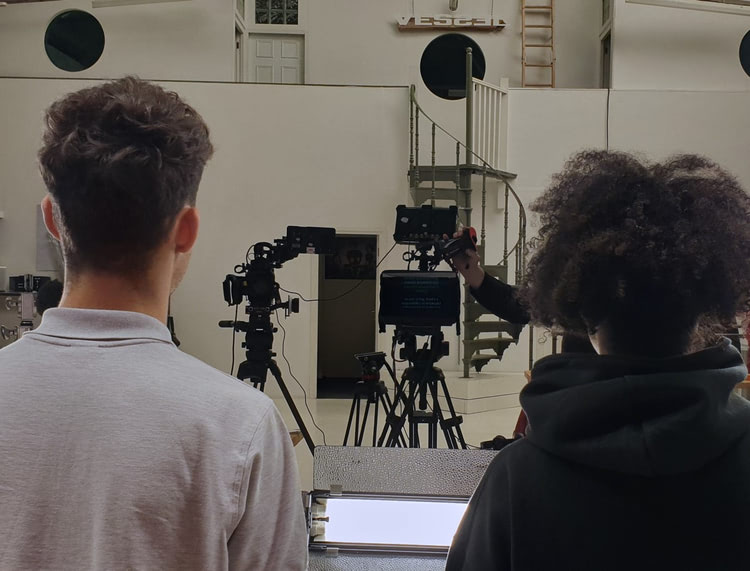ScreenSkills Apprenticeship Programme pilot to unlock millions of pounds of Apprenticeship Levy funds for film and TV industries

@Netflix and @WarnerBros are to partner with the screen industry body @UKScreenSkills on an innovative pilot programme to enable more people to join the film and TV industries through an #apprenticeship
Twenty people aspiring to work in film and television will be trained as broadcast production assistants and as production accountants in the programme which is being supported by the Department for Digital, Culture, Media and Sport.
The ScreenSkills Apprenticeship Programme pilot has been devised to help unlock millions of pounds of Apprenticeship Levy funds for the booming screen industries. All businesses with a pay roll of £3 million or more pay the Apprenticeship Levy to support apprenticeships across all industries.
However, this system, introduced in 2017, requires apprentices to be employed by a single employer for a minimum of a year. As film and television productions can rarely offer continuous 12-month employment, the ScreenSkills pilot scheme aims to find a solution to this challenge.
ScreenSkills estimates that the screen industries are unable to utilise around 75% of the apprenticeship levy they currently pay.
Production accountants and broadcast production assistants have been identified as roles in high demand where apprenticeship standards have been developed or adapted for screen. ScreenSkills will employ the apprentices, organise their training and arrange for them to do industry placements with Netflix and across the WarnerMedia group, including Warner Bros. and HBO, after initial training to prepare them to be “set-ready” for their placements.
Recruitment will start shortly, with apprentices commencing their placements in the summer. Applications will be particularly encouraged by individuals from groups currently under-represented in the screen industries. Additional qualifications beyond GCSEs in maths and English will not be a requirement.
It is expected the apprentices will have the opportunity to work on multiple productions. Warner Bros. productions filming in the UK in 2020 include The Batman, Fantastic Beasts 3 and season two of Pennyworth. HBO shows filming in the UK this year include The Nevers. Netflix productions include The Crown, Bridgerton and The Witcher.
At the conclusion of the pilot, it will be assessed based on completion, pass and satisfaction rates of the apprentices, satisfaction of the companies providing placements, and the financial and practical sustainability of the model.
The ScreenSkills Apprenticeship Programme pilot was announced today by Culture Secretary Nicky Morgan, with Education Secretary Gavin Williamson, on visits to Warner Bros. De Lane Lea, the Oscar and BAFTA-award winning post-production facility in Soho, London, and to HyperActive Broadcast’s flagship post-production facility, also in Soho, to view editing of Netflix’s award-winning production of The Crown.
Baroness Morgan said: “The creative industries are one of the UK’s biggest success stories and play a pivotal role in shaping how the rest of the world sees us. I hope this new pilot scheme will give young people from all backgrounds the chance to gain experience at the forefront of our vibrant screen sectors, inspiring future careers and helping to secure the sustained growth of the industry for years to come.”
 Education Secretary Gavin Williamson said: “It’s absolutely fantastic to see global companies like Netflix and Warner Bros. investing in apprenticeships to help young people pursue exciting careers in TV and film.
Education Secretary Gavin Williamson said: “It’s absolutely fantastic to see global companies like Netflix and Warner Bros. investing in apprenticeships to help young people pursue exciting careers in TV and film.
“Britain’s creative industries are a huge success at home and abroad. This innovative partnership will provide the opportunity for apprentices to gain the skills they need to get ahead in the industry while working on major productions.
“We recognise that more needs to be done to make sure the TV and film industry are able to take full advantage of the apprenticeship system including the levy. This scheme will also help test how we can support them to generate the skilled workforce they are crying out for.”
Josh Berger, President and MD Warner Bros. Entertainment UK and Ireland and Chair, BFI, said: “This pilot is part of our ongoing commitment to creating opportunities and avenues for new diverse voices to enter the entertainment industry during this continued period of growth in UK film and television production. Apprentices already make a valuable contribution across our businesses and by partnering in this pilot we hope to identify a long-term, sustainable solution for the whole production industry to work with the Apprenticeship Levy.”
Anne Mensah, Vice President Original Series at Netflix, said: “This is an incredibly exciting time for UK film and television and we are proud to partner with DCMS, ScreenSkills and Warner Bros. on this important pilot, as we work to unlock and champion opportunities for everyone, across the industry.”
Seetha Kumar, Chief Executive of ScreenSkills, said: “The screen industries are paying millions into the current apprenticeship system, but the freelance and project-based nature of much of the work makes it difficult for all these funds to be used. We hope this imaginative trial will stress-test how best to use the funds to train the workers our sector so desperately needs.”
Individuals who are interested can find out more on the ScreenSkills website.
The Department for Digital, Culture, Media and Sport is investing £100,000 to support the pilot with matching funds from industry. Plans for the pilot were first announced in July 2019 by the then Culture Secretary Jeremy Wright.
The Government’s reforms to the apprenticeship system mean that apprenticeships are higher quality – at least 12 months, with more off the job training and with a proper assessment at the end. There are already a number of high-quality apprenticeships opportunities approved for use for the film and TV industry including broadcast production assistant. But the freelance and project-based nature of TV and film industry work means it has been challenging for employers to take apprentices for the minimum 12 months required.
The ScreenSkills Apprenticeship Programme pilot will examine the practical and financial implications of an external body, such as ScreenSkills, arranging multiple placements and paying apprentices between placements. The host companies will pay for the apprentices when they are on a placement.
Applicants, who must be 18+, will need to have maths and English GCSEs grades at A* to C (or 9 to 4) and the production accountant candidates will also need to demonstrate an aptitude for working with numbers. The principal requirement will be a passion for film and TV.
Production accountants and broadcast production assistants have been chosen as roles in high demand and where apprenticeship standards have been developed or can be adapted from those for other industries. There are many job roles in the screen industries where no apprenticeship standard has been developed because they are principally freelance positions where it is difficult to place the apprentice with a single employer for the minimum 12 months currently required. Production schedules mean it is not always possible for workers to go straight from one production to the next.











Responses